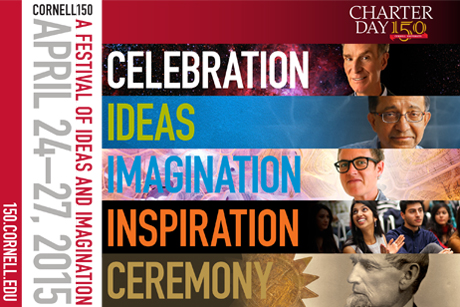Celebrate 150 great years at Charter Day Weekend, April 24-27
By H. Roger Segelken
Celebrations, commemorations and a festival of ideas and imagination will overflow for four days, April 24-27, during Charter Day Weekend in Ithaca.
“With the possible exception of Ezra Cornell and Andrew Dickson White, no one knew what to expect when New York Gov. Reuben F. Fenton signed into law the enabling legislation that became the Cornell Charter on April 27, 1865,” said Glenn C. Altschuler, Ph.D. ’76, American studies professor, dean of the School of Continuing Education, university historian and chair of the Sesquicentennial Steering Committee that planned the celebratory weekend. “A century and a half later we fully appreciate what Ezra and Andy hath wrought – and it’s taking a sesquicentennial year to observe.”
Registration opens Feb. 24
All Charter Day Weekend events are open to the public. Events require advance registration; online registration opens Feb. 24. Live streaming will be available for certain events.
“A high point of the Cornell sesquicentennial in Ithaca will be Charter Day Weekend,” said Mary George Opperman, vice president for human resources and safety services and chair of the Charter Day Operations Committee. “The faculty have planned plenty of events for the intellectually curious. Our students will show off their talents and achievements. Our staff are working hard to support these efforts.
“But there will be opportunities to have some fun, too,” Opperman said, pointing to events like the Big Red Birthday Bash in Barton Hall, April 24.
The four-day celebration aims to engage the entire local community: “We will showcase the best of what Cornell has become,” said Nancy Meinig ’62, honorary co-chair with her husband, Peter Meinig ’61, of the Sesquicentennial Steering Committee. “Celebrations are scheduled throughout the U.S. and around the world,” noted Peter Meinig, chairman emeritus of the Cornell Board of Trustees. “Ithaca, where it all started, will be the epicenter of the sesquicentennial universe, and Charter Day Weekend is the chance for the community to see what all the excitement is about.”
Scores of events – expositions of student innovation, dances and performances, panel discussions and lectures, literary readings by notable alumni, artistic exhibitions from the atomic scale to the astronomical – are listed at the Charter Day Weekend site. (National and international events are listed at the sesquicentennial site.)
The gala weekend wraps up Monday, April 27, with the Charter Day ceremony in Barton Hall.
Other Sesquicentennial Steering Committee members responsible for planning this historic weekend include faculty members Rosemary Avery, David Feldshuh, Isaac Kramnick and Rebecca Stoltzfus; Dean of the University Faculty Joe Burns; Associate Vice President Betsy Shrier; Vice Provost Judith Appleton, Vice President for Alumni Affairs and Development Charles Pflegar and Associate Vice President for Communications Tracy Vosburgh; project associate Kristin Hopkins; and student Natalie Rosseau ’16. M.J. Herson ’68 and his team from Herson Group will produce the weekend events.
What’s a charter anyway?
Ezra Cornell and Andrew D. White were freshman New York state senators (elected in 1863, a year after the federal Morrill Act of 1862 funded agriculture colleges), when they met in Albany and decided to found a university.
Much politicking later, the enabling legislation – to make the proposed Cornell University the state’s sole land-grant institution – passed the New York State Assembly April 21, 1865, and the state Senate a day later.
As White, Cornell and a few other dignitaries stood by in the Albany chambers of Gov. Reuben F. Fenton, the legislation was signed into law April 27, 1865. That made the bill the Charter of Cornell University, and made April 27 Charter Day.
The document committed the new university “… to teach such branches of learning as are related to agriculture and the mechanic arts, including military tactics, in order to promote the liberal and practical education of the industrial classes in several pursuits and professions of life.”
The charter goes on to say “… other branches of science and knowledge may be embraced in the plan of instruction and investigation pertaining to the university as the trustees may deem useful and proper.”
With the hard-won charter in hand, the founders and the first university trustees set about recruiting faculty and building a campus on hilltop farmland donated by Ezra Cornell.
On Oct. 7, 1868, Cornell University opened for instruction. Mark your 2018 (and 2068) calendars for subsequent celebrations.
Media Contact
Get Cornell news delivered right to your inbox.
Subscribe